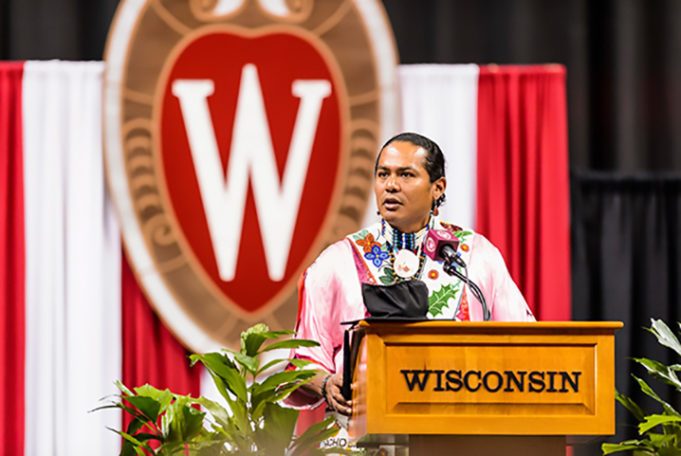 This story was written for Badger Vibes, our collaboration with the University of Wisconsin Foundation and Alumni Association to highlight the diverse UW experience.
This story was written for Badger Vibes, our collaboration with the University of Wisconsin Foundation and Alumni Association to highlight the diverse UW experience.
As the executive director of business of Ho-Chunk Nation, David Greendeer is in charge of all gaming and nongaming enterprises for the organization.
“I oversee the executive manager at every single property. That’s seven total properties,” Greendeer says. “I oversee about 2,500 employees total.”
On the business/executive side, Greendeer oversees all Ho-Chunk Gaming locations in Wisconsin Dells, Madison, Tomah, Black River Falls, Nekoosa, and Wittenberg, as well as the new one being built in Beloit. Formerly known as the Wisconsin Winnebago Tribe, the Ho-Chunk Nation owns and operates these properties and is a sovereign nation with its own elected government.
“On the government side, I am an official appointed by the president of the Ho-Chunk Nation, President Wilfrid Cleveland, and I’m confirmed through the legislative branch of the tribe,” he says.
What Greendeer likes the best about his job, he says, is being able to “plan for the future of my sovereign nation.”
“The decisions that I make today impact all of our people tomorrow,” Greendeer says. “Ho-Chunk Nation is in a very unique position compared to other trust-based, land-based, reservation-based tribes. Ho-Chunk is a nonreservation-based tribe. So, when I go to an area and build somewhere, I’m always building for the surrounding community as well. I always have to make sure that I’m planning for other stakeholders.”
That means he works with other Ho-Chunk departments and officials to increase the Nation’s footprint in the community.
“So, if I put a facility in Madison … you will see Ho-Chunk Gaming in Madison, but what you won’t see across the bridge and underneath the underpass is that we have a new facility — the Ho-Chunk DeJope Community Center. It’s totally two different departments [of the Ho-Chunk government]. I don’t oversee the community centers, but at the same time, it’s an example of how Ho-Chunk has expanded and has helped to build and bring in more of a communal-based effort to not just unify all of the Native people in the area but to have a community center for all of the people.”
“Whatever I produce here in terms of revenue goes into government programs, and we are able to produce services across the board in one of our 12 departments,” Greendeer says. “It’s pretty cool to know that. It’s cool to know that what we’re doing now is making an impact on the future.”
Business Leader and Activist
Beyond all of the work Greendeer does as the executive director of business for Ho-Chunk Nation, he is also an outspoken activist. He strives to preserve nature from destruction at the hands of humans and to boost tribal nations in their ability to protect their interests in general. He worked to develop the “Rights of Nature” resolution presented at the 2016 Ho-Chunk General Council meeting, which later became a constitutional amendment of the Ho-Chunk Nation.
“The word ‘Ho-Chunk’ means ‘to speak to the creator from your soul.’ The word itself is a verb; it’s not a proper noun. Human beings, according to our way of life, were created last,” he says. “I just saw an interesting thing yesterday when I was in the state capitol talking to Governor Tony Evers. Inside the room that we shook hands in, on the ceiling there was this statement that said, ‘the will of the people is the law of the land.’”
Greendeer took a selfie with that quote.
“I said to myself, ‘That’s the difference.’ Ho-Chunk and Native people from all over the world would not say that. We would have that reversed,” he continues. “There is a law of the land and the people are just carrying out the will of that. We don’t put people first. We are the last thing. We’re here to take care of everything because everything was made before us.
“So these mounds — and any holy body — is looked at from that perspective,” he continues, referring to the hilly Wisconsin landscape. “The mounds preceded us. They were here before human beings were.
“Over the years, they’ve built over many of the things that we’ve once had,” Greendeer says. “As we continue to rebuild our nation and our people, we’re pretty much in a race against time to preserve what we can, and that’s why we stand up for the rights of nature. We’re trying to preserve the histories of the world so that people understand what’s happening here.”
A Turning Point at UW–Madison
Greendeer holds a bachelor’s degree in communication and media studies from Winona State University, a master’s degree in educational leadership and policy analysis from UW–Madison, and a master of business administration from Edgewood College.
“I had a great experience at [the] UW. There was one woman in particular, Dr. Colleen Capper, who really left an impression on me, and I will never forget her class. It has the most impact on me,” Greendeer explains. “She was really hard on me in terms of my writing. She had a reputation for being hard, but I knew she was there to help me to communicate better. To her, communication was the key to success in the world.”
Capper, a professor in the Department of Educational Leadership and Policy Analysis at the UW and cofounder of Integrated Comprehensive Systems for Equity, worked with Greendeer to strengthen his ability to write effectively.
“Traditionally, I didn’t speak [English] that well, but I can understand pretty well. In Ho-Chunk, our language is spoken where we put verbs at the end — and not in the middle or the beginning — of the sentence. Without knowing my background, some people would think that it’s like dyslexia,” Greendeer says. “So it was a really big struggle for me. If I wouldn’t have had that class, and if Dr. Capper wouldn’t have been as strict — but also as helpful — at taking the time to work with me, I would have never made it through grad school.”
That was the class that changed everything for him.
“I know for a fact that people were afraid to take her course. And it was very hard for me. But that was one of the pivotal courses for me,” he says. “The University of Wisconsin really set me up for my next venture.
“All of the coursework and everything I learned, the policy portion of it and the writing really helped me with my current position with the tribe to understand legislation and how to structure arguments and how to develop process for problem-solving,” Greendeer adds. “That’s something that is so important for leadership.”




























